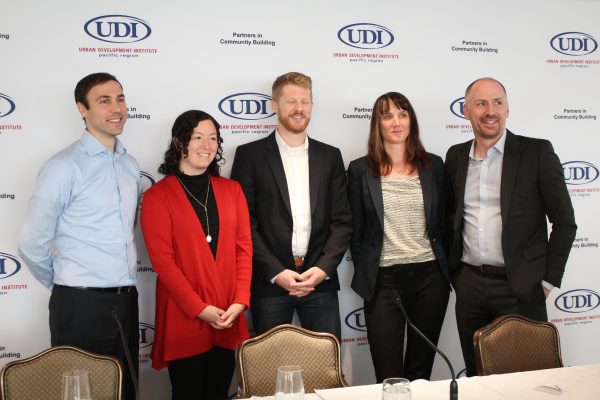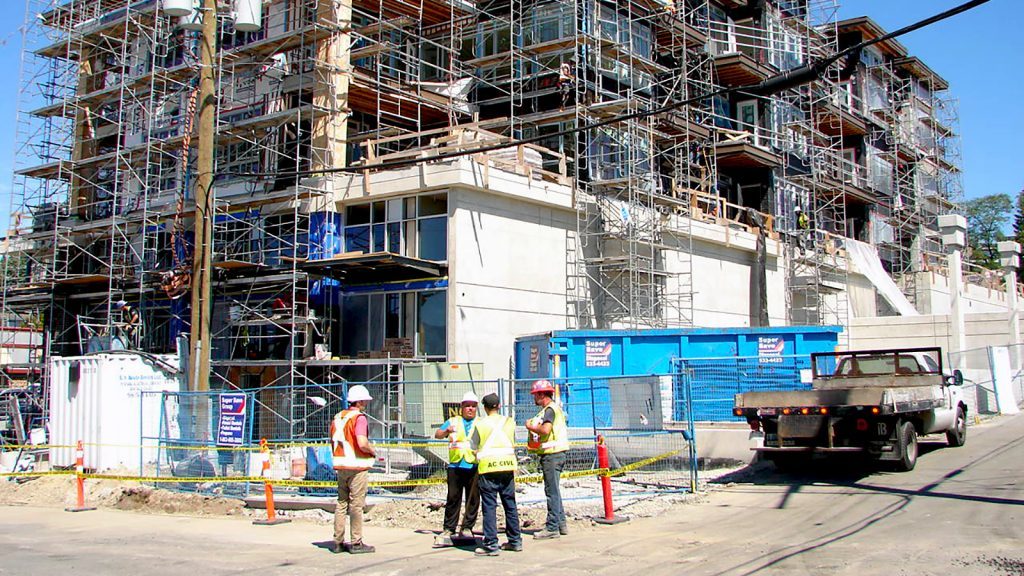A new incentive program is looking to help British Columbia’s construction industry step up to better buildings.
The Better Buildings BC incentive program recognizes multi-family residential, commercial and institutional building projects that have achieved the highest level of performance in the BC Energy Step Code, a voluntary standard that establishes a series of performance based energy efficiency requirements that go beyond those prescribed by the BC Building Code.
The new program, funded by the provincial government, Natural Resources Canada and Forestry Innovation Investment and managed by Integral Group, was launched at a seminar held at by the Urban Development Institute (UDI) on Oct. 10.
Integral Group head of research and planning Lisa Westerhoff detailed the plan and participated in a panel session.
“The Province of B.C. has mandated that all new construction projects will have to meet a net-zero energy level of performance by 2032, and they’ve recognized that there a bit of a learning curve. What this program is designed to do is reward those design teams and developers who are getting ahead of the curve and also incentivizing projects we can learn from, so we can help the industry understand how to get to that performance by 2032,” Westerhoff said.
“We’re accepting expressions of interest until Nov. 30, representing the first round of applications. What design teams need to be thinking about is the kind of strategies that they’ll be using in order to hit a net-zero energy standard-ready level of performance, cost competitiveness of those design strategies, and how replicable those strategies are for the rest of the building industry.”
Once expressions of interest are submitted, those selected must submit a more detailed program application by Mar. 30, 2019, with final selection in May 2019. The minister of mines, energy and petroleum resources will announce the chosen projects by June 2019.

Successful applicants receive different forms of incentives. The design incentive scales with the size of the project up to a maximum of $40,000 and the net-zero energy-ready incentive varies with building type to a maximum of $350,000. Successful applicants are also given an award of recognition and showcased to the building industry and public.
Different types of buildings must hit different requirements in order to receive incentives, Westerhoff added.
“The program is incentivizing buildings that target Net Zero Energy Ready level performance and that translates to the highest level of the Step Code. For multi-unit residential buildings, that’s a Step 4 level of performance, and for commercial, office and retail buildings, that’s a Step 3,” she said.
“We’re also accepting applications from any Passive House building or one seeking Passive House certification as well as any project targeting the top level of the zero-emissions building plan at the City of Vancouver.”
Every application will be reviewed by a technical review panel and an assessment committee who judge the project based on criteria such as greenhouse gas emissions (GHG) reduction, replicability, cost-effectiveness, social and environmental benefits and overall esthetic. Tools are also in place to avoid conflicts of interest during the evaluation process.
“All applications are going to be anonymous to the reviewers who are reviewing them. We have enough people on both the assessment committee and the technical review panel so that in the case that one of those people is involved in the project under evaluation, they will recuse themselves and someone can sub for them,” she said. “We also have two neutral chairs sitting on both committees to ensure the process is fair. Ultimately the final decision will be by the province.”
Other participants at the UDI seminar updated the audience on concurrent efforts by government and industry to streamline the push towards net-zero energy buildings.
“The goal is to support voluntary leaders, build capacity and advance the supply chain,” said City of Vancouver senior green buildings planner Sabina FooFat.
There is a cost premium to building to Passive House standards, FooFat said, and Vancouver’s recently introduced Zero Emissions Buildings Catalyst Tools are intended to incentivize builders.
Projects that hit the zero energy or Passive House standard, along with development permit projects in a district schedule zone and projects with six or more residential units are eligible for up to a five per cent floor space ratio increase, she said.
“Being first is not without challenges, but we hope offsets will encourage early champions to try Passive House and other energy efficient buildings,” Foofat added.
Zero Emissions Building Exchange (ZEBx) executive director Christian Cianfrone gave an update on the collaborative physical and virtual platform.
“Building capacity is an element of the City of Vancouver’s plan for most new buildings to be at a zero-emission standard by 2025 and ZEBx is here to help build that capacity. It aligns well with the Step Code, and we’re here to help create a forum to share knowledge, both physically and virtually,” Cianfrone said.
Cianfrone echoed Building Better BC’s emphasis on a holistic approach to new buildings.
“We want buildings to not just get to zero in any way possible, but rather how do you make sustainable, attractive buildings that we all want to live and work in?” he said.











Recent Comments